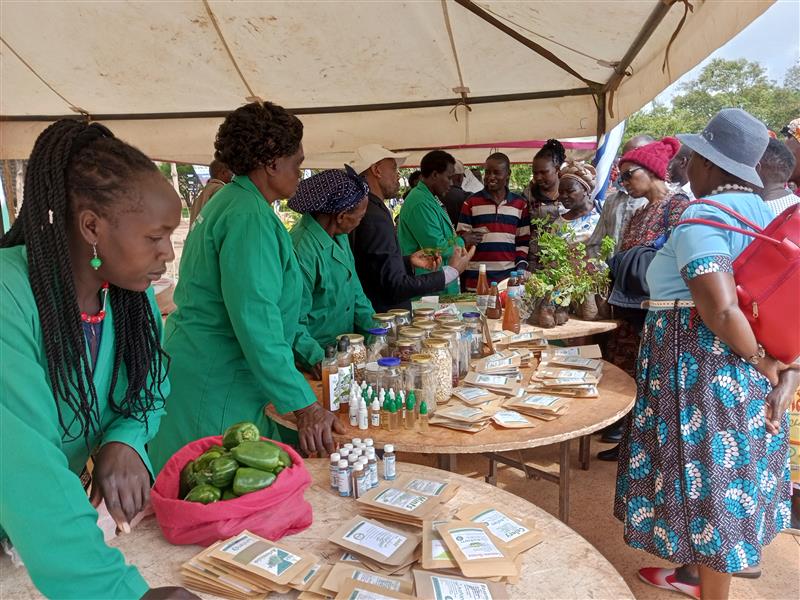Consumers are key stakeholders in our food systems, yet their role in driving the transition from industrial agriculture to agroecology is often overlooked. The Consumer Guide on Agroecology, published in 2023 by the Consumer Grassroots Association (Kenya), emphasizes that consumer engagement is essential for shifting toward more just, sustainable, and locally rooted food systems.
Agroecology is not just about how food is grown. It’s also about who eats it, how it is shared, and the relationships built around it. It places both food producers and consumers at the center of food system transformation. The agroecology principle of Connectivity is about ensuring proximity and confidence between producers and consumers through promotion of fair and short distribution networks and by re-embedding food systems into local economies.
How agroecology empowers consumers
Agroecology strengthens the role of consumers by fostering local, transparent, and participatory food networks. In contrast to dominant corporate food chains, agroecological systems prioritize community-based alternatives such as:
- Short value chains and local food networks
- Education around seasonal and regional food
- Public procurement policies that favor agroecological products
- Local farmers’ markets, worker cooperatives, and community-supported agriculture (CSA)
- Participatory Guarantee Systems (PGS) for transparent, community-based food certification
- Community restaurants and soup kitchens sourcing from local agroecological producers
These alternatives help consumers connect more directly with producers, making food systems more democratic and responsive to local needs.
Embedding Consumer Roles in National Agroecology Strategies
Several countries are recognizing the role of consumers in their national agroecology strategies. Among them are:
Kenya: Kenya’s National Agroecology Strategy for Food System Transformation (2024–2033) includes clear measures to promote the “sustainable consumption of healthy foods.”
Tanzania: Tanzania’s National Organic and Agroecology Strategy (NEOAS), launched in 2023, emphasizes improving food and nutrition security. The country is seeing growth in both domestic and export markets for organic products, driven by rising consumer awareness—especially among urban middle- and upper-class populations.
Chile: Chile’s Transition to Sustainable Agriculture Programme (TAS, 2023–2025) supports consumer education on the benefits of agroecological farming. The program promotes:
- A strong public narrative about the health and environmental benefits of agroecology
- Bio-factories that reduce input costs through recycling and local bio-inputs
- Gradual adoption of agroecological practices through hands-on learning and experimentation
- Strengthened farmer networks to support local marketing, input sharing, and seed exchanges
A key takeaway from TAS is the importance of creating marketing infrastructure and physical sales spaces to connect informed consumers with agroecological products.
Building Consumer Awareness and Trust in Kenya
Consumer Grassroots Association, based in Kenya, empowers people to protect their rights and make informed food choices. Through their Consumer-Farmer Connect program, they facilitate direct interactions between consumers and agroecological farmers.
In a conversation with Alice Kemunto, Executive Director of the Association, she emphasized the power of learning through direct experiences: by visiting farms, consumers gain firsthand insight into how food is grown without chemicals, and why it matters.
Educators often begin by relating agroecology to organic farming, then explain how agroecology also includes social justice, cultural traditions, and community empowerment. Connecting agroecology to ancestral practices also resonates strongly with local communities.
However, Alice noted some challenges: agroecological products are not always affordable or available for low-income populations, and government support has been weak. Ensuring access and affordability remains a key priority.
Alternative Markets in Brazil to scale agroecology
Instituto Regenera, based in Brazil, is tackling the structural challenges that prevent small agroecological farmers from accessing conventional markets.
Co-founder Fabricio Muriana shared that many producers are excluded from supermarket chains due to high entry barriers and unequal power dynamics. Rather than forcing participation in these exploitative systems, Instituto Regenera is building alternative markets rooted in values of sustainability, health, and cooperation.
These markets cater to an increasingly aware segment of consumers, particularly concerned about Brazil’s heavy pesticide use. Community-run retail spaces, cooperatives, and local fairs are emerging as viable platforms where farmers and consumers can interact directly, strengthening food sovereignty and economic resilience.
Global Case Studies: Consumer-Driven Agroecology in Practice
Several initiatives presented within the Agroecology Coalition’s Implementation Working Group showcase the diverse ways consumers are engaged globally:
- Tarik Akhdar (Lebanon): Fair Trade + Agroecology = stronger producer-consumer relationships and improved local distribution.
- Agri-Urb Project (Mozambique): Agroecological fairs in urban areas raised awareness and connected consumers directly with farmers.
- Agrobiodiversity on a Plate (Niger, Chad, Tanzania, India): Promoted consumption of resilient orphan crops, reaching 3 million consumers annually with healthier diet messages.
- VITAL Project (Ivory Coast): Advocated for agroecological transitions through public dialogue involving farmers, consumers, natural resource managers, and policymakers.
- Heal the Planet Programme (South Africa): enabling environment for agroecology in Southern Africa by investing in community-led food systems, scaling Participatory Guarantee Systems.
Consumers as agents of change
Consumers are not just passive recipients in food systems, they have the potential to be active participants who can influence how food is grown, distributed, and valued. Agroecology recognizes this by restoring the connection between people, food, and the environment.
For the agroecological movement to scale, consumer education, policy support, and equitable market access must go hand in hand. From Kenya to Brazil to Chile, inspiring models show how empowered consumers can help lead the transition to a healthier, fairer, and more sustainable food future.
Find out more here:
Consumer Grassroots Association: consumergrassroots.org
Instituto Regenera: institutoregenera.org.br/en

